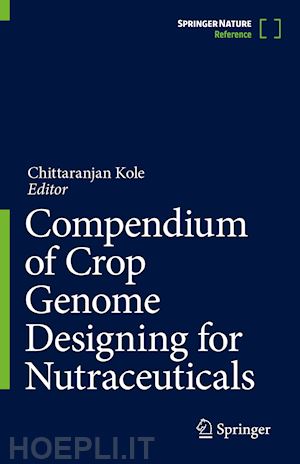

Questo prodotto usufruisce delle SPEDIZIONI GRATIS
selezionando l'opzione Corriere Veloce in fase di ordine.
Pagabile anche con Carta della cultura giovani e del merito, 18App Bonus Cultura e Carta del Docente
Prof. Chittaranjan Kole is an internationally renowned academician with a spectacular professional career of about 40 years!. His pioneering scientific contributions, specifically in the fields of plant genomics and biotechnology, have been globally appreciated. Prof. Kole has developed a number of original concepts and strategies, which have contributed enormously to science and benefited the national as well as global society. His scholarly publications include 150-plus research articles and over 180 books with globally reputed publishers. Prof. Kole’s academic contributions have been profusely appreciated by seven Nobel Laureates including Profs. Norman E. Borlaug, Arthur Kornberg, Werner Arber, Phillip A. Sharp, Günter Blobel, Leland H. Hartwell, and Roger D. Kornberg. His scientific achievements have been honored with several awards, fellowships and recognitions including the “Outstanding Crop Scientist Award” conferred by the International Crop Science Society in recognition of his “life-time and original contributions in the field of crop science.”
Prof. Kole worked as a researcher, faculty member and administrator in a large number of premier institutions and universities in India and abroad. In India, he worked across all academic positions from an Assistant Professor to Vice Chancellor in three premier universities including Orissa University of Agriculture and Technology, Sam Higginbottom University of Agriculture, Technology and Sciences, and Bidhan Chandra Krishi Viswavidyalaya. He also worked in Indo-Russian Center for Biotechnology as its First Project Coordinator. In abroad, he worked in the USSR Academy of Sciences, erstwhile USSR, as a PostDoctorate Scholar; University of Wisconsin, USA as an Overseas Research Associate; The Pennsylvania State University, USA, and Clemson University, USA, as a Visiting Professor; and Institute of Nutraceutical Research at Clemson University as Director of Research.
Prof. Kole is recognized as a visionary science leader in the global arena. He is the Founding President of three international organizations including the Genome India International, International Climate Resilient Crop Genomics Consortium, and International Phytomedomics and Nutriomics Consortium. In recognition of his international leadership quality, the Food and Agriculture Organization invited Prof. Kole to act as the Leader of the Climate Change theme for the FAO International Symposium on “The Role of Agricultural Biotechnologies in Sustainable Food Systems and Nutrition” in 2016. He organized and chaired many prestigious international workshops, chaired several technical sessions; and delivered innumerable invited plenary lectures and keynote addresses in many international scientific meetings.
Prof. M. S. Swaminathan, World Food Prize Laureate, once wrote to Prof. Kole that “You are a role model for all of us.” while Nobel Laureate in Chemistry Prof. Roger D. Kornberg wrote to the Honorable Prime Minister of India about Prof. Kole that “your country will be increasingly benefitted by utilizing his comprehensive knowledge and visionary ideas on science, education and agriculture.” Above all, Nobel Laureate in Peace, Dr. Norman E. Borlaug, the Father of Green Revolution, wrote to Prof. Kole that “May all Ph.D.s, future scientists and students that are devoted to agriculture get an inspiration as it refers to your work.”











Il sito utilizza cookie ed altri strumenti di tracciamento che raccolgono informazioni dal dispositivo dell’utente. Oltre ai cookie tecnici ed analitici aggregati, strettamente necessari per il funzionamento di questo sito web, previo consenso dell’utente possono essere installati cookie di profilazione e marketing e cookie dei social media. Cliccando su “Accetto tutti i cookie” saranno attivate tutte le categorie di cookie. Per accettare solo deterninate categorie di cookie, cliccare invece su “Impostazioni cookie”. Chiudendo il banner o continuando a navigare saranno installati solo cookie tecnici. Per maggiori dettagli, consultare la Cookie Policy.